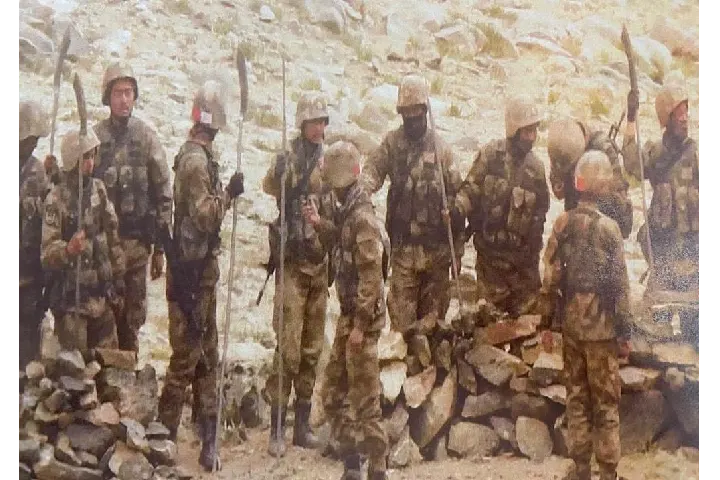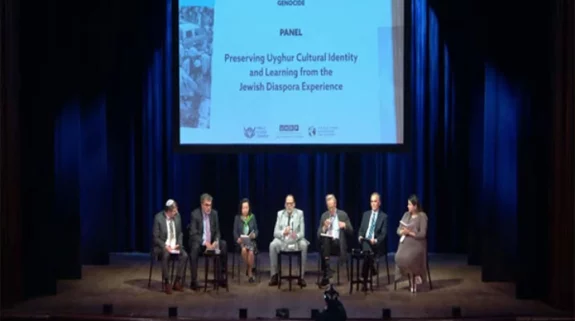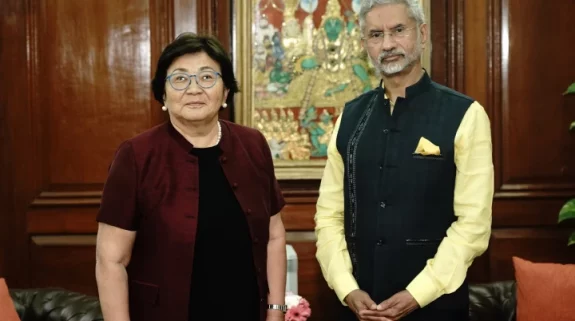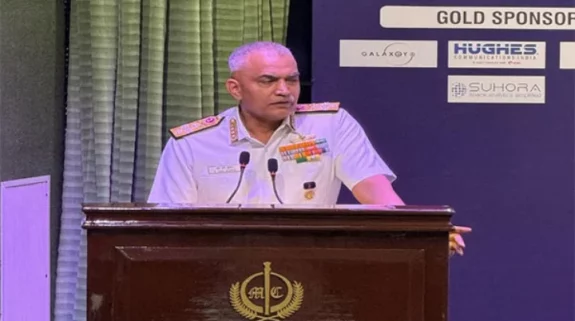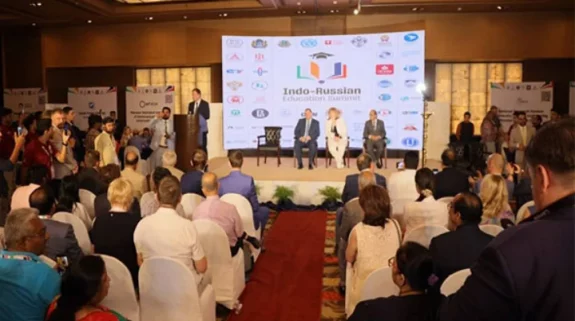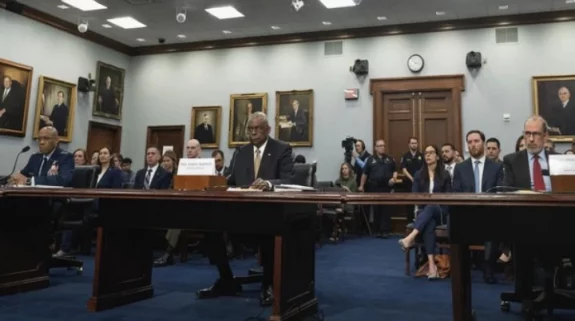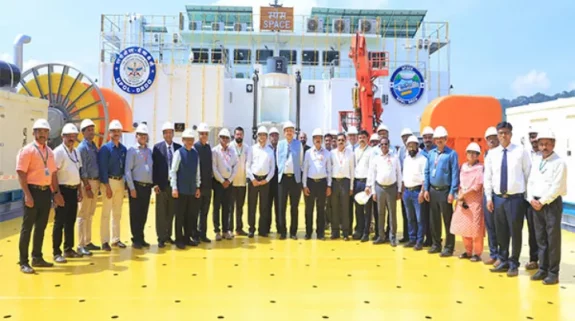Chris Blackburn is the Communications Director of the Swiss InterStrategy Group based in Zurich, Switzerland. He is the recipient of a “Friend of Bangladesh” award from the Government of Bangladesh for his work on counterterrorism and seeking justice for war crimes committed during the War of Liberation in 1971.
Blackburn was also formally acknowledged by India's Prime Minister Narendra Modi for his work in international relations and security in January 2022. Blackburn is the head of European Outreach at Global Friends of Afghanistan (GFA), a US-based think tank that is working with Afghan figures from around the world.
Blackburn speaks with India Narrative at length about India’s standing in the world and how the country is navigating itself through the global chaos in the region and the wider world.

Chris Blackburn, Communications Director of the Swiss InterStrategy Group, is upbeat about India's seat under the global sun
Excerpts from the interview:
Q: What is your view on the dystopian state of the world – the Covid-19 crisis, Russia-Ukraine war, Taiwan under a constant threat, economies under stress, a possible roll-out of militants from Afghanistan and an environmental crisis. Are we witnessing one of the worst global nightmares in recent decades?
Blackburn: Yes, I think the world is facing extreme crisis.
(But) India is growing and thriving because of innovation and good relations across the world. It is realising its potential on numerous fronts. It’s becoming faster at reacting too. Operation Ganga to help Indian’s students stuck in war-torn Ukraine was perfect and the speed at which India reacted and began mobilising talent to the semiconductor chip shortage was also widely praised. Semicon India 2022 was a major economic and diplomatic success.
What we hoped were threats over the horizon are now getting really close to our own doorsteps. It’s a perfect storm. We are living in a very dangerous period. But I’m optimistic that we will be able to meet numerous challenges if we all work together.
Humanity has faced similar threats before. This new age of uncertainty has been heightened by the unravelling of ‘The West’ as a political/social/economical concept that is now on life support. We are looking at a more multipolar world. I think it’s an exciting time. But if we make the wrong choices we could damage human liberty for decades, if not centuries.
That’s why leadership and cooperation matters. India, and other countries, are really needed to help breathe new life and purpose into outdated international initiatives like the United Nations. India is helping lead major organisations such as the Quad Security Dialogue. The decisions made within the Quad alliance will shape the world for centuries. I think India’s outlook and innovation will help the United States, Australia, and Japan to really enhance their capabilities. India will also benefit from their strengths too.
Q: We have spent many growing-up decades hearing about India as a power. Yet we never felt that happen for decades altogether. Do you think that India might be on the cusp of emerging as a power with some heft in global matters now. And, why so?
Blackburn: I think India has been confident and brave for decades. It is a new power, but some quarters are still finding it difficult to adjust. Not being able to find their feet. There isn’t a ceremony or a handover process for becoming a global power. But the rest of the world is already accepting India into that club.
People are now looking toward India for leadership. The Himalayan region is crying out for India to help stop China from undermining their cultures and national sovereignty. I’m confident in Indian leadership across the board. There is a reason why so many Unicorn companies–a term meaning a private start-up which is valued over a billion dollars, that have Indian citizens as CEOs.
Hopefully confidence will continue to grow across Indian society. Political, diplomats and defence leaders are stepping up too.
Q: India itself is witnessing major internal challenges. Is it a reflection of the global chaos or is it a manifestation of the country's internal politics, contested history and varying ideologies fighting for power & space?
Blackburn: The most developed countries can’t even perfect civic life. There will always be problems with change. France, USA, and the UK have all experienced civil unrest due to a variety of problems in recent years. Communalism, economic reforms, and austerity measures due to the economic collapse in 2008 have been the major causes for protests and riots.
The United States is also experiencing one of the most chaotic political periods in its history, but living standards are pretty high. People are angry, but they don’t really know why? Is the rise of social media and a sensationalist media to blame? Was the anger always there? We now have instantaneous methods to connect with people to vent our frustrations on Twitter and other places. Celebrity culture and politics are now in our faces too. Rihanna, the international popstar tweeted about solidarity with the Indian Farmer’s protests last year. A weird sign that perhaps we are becoming way too interconnected. I’m not entirely sure if Rihanna is qualified to give her take on agrarian economics.
If you look through history, there has always been civil unrest when people feel aggrieved. It’s normally restored by local and central government listening to a community’s problems. The Industrial Revolution was faced with violent Luddites and others that didn’t want technological advancement. We hear similar arguments today about technology- Artificial intelligence and robots pushing people out of jobs. But we adapt. Sometimes people seek compromise and other times they just power through in the face of the crisis. India isn’t different to any other country. Good governance and the ability to listen is the key.
Will liberals keep pointing out India’s flaws or acts of defiance against the Modi government? Yes, of course they will. But they do it across the world. India shouldn’t feel like it’s been singled out.
Q: To what extent do you think India will have to tackle the fallout from Afghanistan and the instability in Pakistan – in terms of radicalisation and support to terrorism? If the threat to India has increased, how should India prepare?
Blackburn: India has faced terrorism from Pakistan and Afghanistan for decades. I think it will handle that threat with confidence. India and others will always be friends to the Afghan people. The world in flux could be bad for Pakistan and the Taliban in the long term. India has won plaudits across the world for its role in helping the US-led Global War on Terrorism. India has responded by putting investment into defence, diplomacy, intelligence, and enhancing and building investigative organisations such as the National Investigation Agency (NIA).
The only real problem I see is the added problem of Chinese involvement in the threat. China has been trying to build relations with radical Islamists for decades. People have discounted it saying fundamentalists and atheist don’t mix, but in 2009 the Jamaat-i-Islami of Pakistan signed a Memorandum of Understanding with the Chinese government to cooperate. China have also moved to mute Islamists working against the Chinese state in Xinjiang. That’s an overlooked threat that is emerging. Authoritarians and bullies stick together. They use violence and coercion to crack down on individual liberty. They hate pluralism and innovation unless it’s to heighten control and order.
Q: Indians love to criticise the Western media for allegedly portraying a completely opposite/false narrative of the country. Do you also think with the assumption that the Western press is unfair to India?
Blackburn: I think journalists can be unfair. Sometimes it’s due to naivety and sometimes it’s deliberately provocative. Being negative and sensationalist is good for business too. So, I wouldn’t discount the click-bait element. For them, firing a cheap shot at Modi’s India is good for business. A lot of English-speaking press have large audiences with Indian liberals. The Guardian and The New York Times have tried to conquer the Indian market. Being critical of the BJP and the Modi government gets eyes on pages. It benefits their customers.
However, I think that journalists as a whole are beginning to realise that threats against their profession or criticism in India is nothing compared to journalists operating in and around China. Free speech is under direct threat in Hong Kong and China’s aggressive expansionism could make it a worrying taste of the future. I’ve noticed in the last few years that Indian politicians of every stripe are beginning to take the China threat seriously. It’s a trend growing across parliaments around the globe.
Q: Do you think that India is still ambivalent about how to confront China?
Blackburn: I think a lot of countries were hedging their bets waiting for others to act, however China’s actions across the globe have created a real resolve. Countries realise that we’ve been funding the build-up of aggressive Chinese nationalism. Chinese hybrid democracy has created arrogance and a constant thirst for more. It’s embraced the worst of capitalism. They want includes political, diplomatic and economic capital beyond their borders. They are also looking to seize new territory. They are currently building on disputed land without caring about international law or the consequences. If they don’t have the land, they are creating artificial Islands in disputed waters in the South China Sea. They are a rogue empire.
This is the challenge the rest of the world faces. India will never be alone. It may seem like it at time. But the Quad and other global initiatives are beginning to get serious with containing and confronting China’s belligerent behaviour. We simply can’t afford to lose. All of our liberty and values are at stake.
Read More:
With billions of dollars, India's Neighbourhood First policy comes to the aid of South Asia
Has the Quad shifted focus from geopolitics to geo-economics and development?






